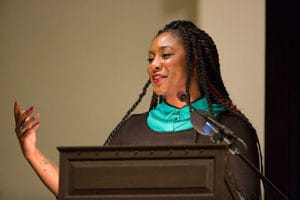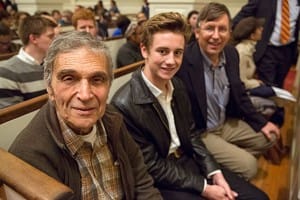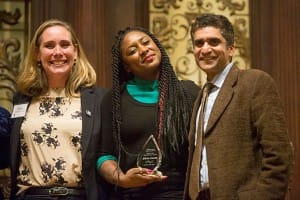As I walked through Tercentenary Theater, I clutched my notebook and copy of “Harvard Diary” tightly – it was almost Halloween. The glowing lights of Memorial Church did seem rather ominous in an otherwise dark and empty yard. It was too late for classes but too early for students to be out and about on a Friday night.

Before I drew closer to the wide steps of the church, I realized my mistake – it was not empty at all. Three lines of people stood waiting to enter the doors to hear what Alicia Garza had to say.
That evening she would be receiving the Robert Coles “Call of Service” Award. The Coles Award is certainly prestigious, if for no other reason than that Harvard’s famous Dr. Robert Coles is known to set the bar very high to encourage others to follow his example.
Dr. Coles is a “former PBHA [Phillips Brooks House Association, Harvard’s student-run public service organization] volunteer, civil rights worker, child psychologist, Harvard professor and Pulitzer Prize winner,” but he means more to some people than those words can encapsulate. My own father took Dr. Coles’ class and gave me his book – “Harvard Diary” – as a gift. Though it is not one of his more academic works, it contains a collection of reflective essays he wrote in Cambridge that has influenced my own time here.
Garza’s work has become equally influential in the turmoil of recent events surrounding police brutality. She holds the position of special projects director for the National Domestic Workers Alliance and has been described as an “organizer, writer and freedom dreamer.” She has received numerous other awards and commendations for her work. Her writing has been featured in multiple notable publications.
Garza is perhaps best known for her co-founding of the #BlackLivesMatter network to combat anti-Black racism in 2013. However, I find that, as with most truly great leaders, the people who love her most do not describe her by her titles, but by her unassuming air and her deep passion for the cause.
And so I found my seat, sat and took a moment to look around me. Phillips Brooks House Association (PBHA) volunteers and organizers ushered the audience in to those rows of high-backed pews. The sheer size of the audience surprised me.
My surprise grew as I took in the diversity of the audience. Frankly, I had expected the majority to be Harvard College students but I was wrong. Adults of every age crowded the pews and even high school students dotted the aisles as they tried to find their friends.

Multiple media groups walked around with cameras and my attention was drawn to an elderly man sitting in front of me. He was having his picture taken with his family, I presumed. Realizing it must be Dr. Coles, I quickly flipped to the back cover of my book. Though the picture was of a much younger man, the smile was the same.
I wondered how long it would be before the first speaker began and how long it would take me to work up the courage to go and say hello to an idol of mine. When I finally managed to squeeze in a “Hi, I’m Caroline and I love your book,” he responded with humble appreciation and jokingly submitted, “I hope I didn’t bore you!” After thanking him profusely and ineffectively, I returned to my seat and felt the buzzing energy that connected every person present.
The first to quiet the crowd was PBHA president Jing Qiu’16. She and Maria Dominguez Gray, Class of 1955 executive director of PBHA, both welcomed everyone to what was to be a very special evening. Then Daunasia Yancey, organizer of Black Lives Matter, Cambridge, introduced Alicia Garza, calling her “awesome” among other things.
Our very own dean of Harvard College, Rakesh Khurana, stepped forward next. In his characteristic manner of talking to the crowd as if he were talking to an old friend, he quoted the mission of Harvard College and reminded us all of the appropriate setting for this event – beneath the walls that memorialized soldiers of the past. With that he turned, and to the sound of great applause, handed the award to Alicia Garza.
The time had come Garza herself to speak. She walked up the stairs of the innately carved wooden rostrum and silence fell. She wore a dark sweater and jeans and tossed her hair over her shoulder before beginning.
Garza spoke softly and slowly but with a poetic rhythm that filled the hallowed hall. She thanked those people who are working towards identifying and creating “the world we want to live in.” Those are the people who have not forgotten what the news stations have stopped reporting. She brought a tear to every eye in the audience as she listed the names of people who have “become ancestors too soon.”
Garza then described the birth of the #BlackLivesMatter network as her attempt to find words in answer to the events of 2013. Garza eloquently addressed criticisms of the campaign and her work.

To those who claimed #BLM meant to restructure the hierarchy of society, she responded, “When Black people are free, truly free, everyone has the opportunity to be free.” After such sobering words, Garza ended with an optimistic view on how students can answer the call to service as Harvard graduates. She knows, tho’ much is taken, much abides. Her encouragement focused on creating a “regenerative” society and new ways of being. A previous description of her proved accurate; those around her were filled with awe.
Never hurried or impatient, Garza made her avowal loud and clear to every member of that audience, regardless of differences in background or belief. I realized as we stood in ovation that she possessed the rare ability to speak to people and make them listen. In a society where much of what we say is simply self-serving noise, Garza breaks the mold to answer the call.
Students stood in line to ask Garza for her valued advice and then we exited the building to the stirring voices of the Kuumba Singers. Leaving the nave of the church, I found the yard not as dark as I had left it. Halloweekend had begun and the traditional jaunts of the times danced before me.
On my walk back to the river, I reflected, as I know anyone present at the ceremony would, on what Harvard has given us: access to heroes such as Dr. Coles and Alicia Garza who change the course of history only by doing what they love. Their example inspires those made weak by time and fate, but strong in will, to strive, to seek, to find, and not to yield.
Caroline C. Cronin, Class of 2018 (ccronin01@college.harvard.edu), continues to be inspired by Robert Coles, Alicia Garza, Alfred Lord Tennyson and others who drink life to its lees. This story first appeared in the Harvard Independent. “One equal temper of heroic hearts” is a line from “Ulysses” by Alfred Lord Tennyson. “Temper” refers to the degree of hardness and elasticity in metal. Like a blade “tempered” in the blacksmith’s fire, Ulysses’ warriors are strong, resilient and formidable.





